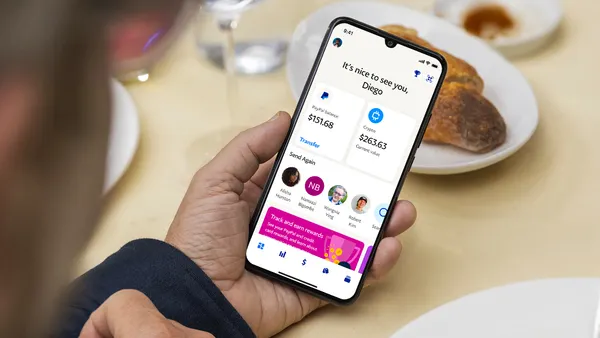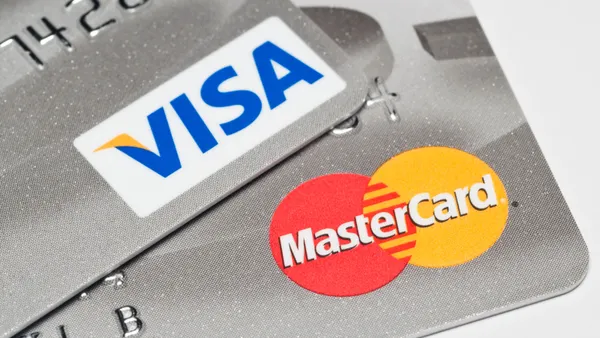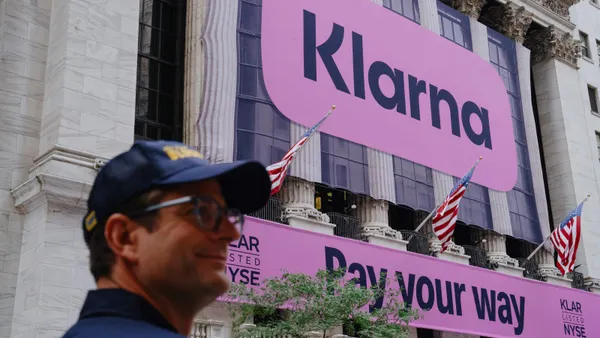The war of words between Amazon and Visa is heating up.
First came the announcement that the Seattle-based retailer would no longer accept Visa credit cards originating in the United Kingdom as of Jan. 19 because of a dispute over fees. Now, Amazon is also reportedly is in talks with Mastercard to shift its co-branded card to that company from Visa, according to Bloomberg News.
Amazon risks alienating customers if it goes through with its Visa U.K. credit card ban, according to David Koning, an analyst with Robert W. Baird, an investment bank and financial services company.
"They're gonna run into a lot more carts being abandoned," Koning said in an interview. "It might lower their costs, I think maybe by 0.2%. But if one out of 500 people says, `I don't want to type in a different (card) number. I'll just go to some other merchant and do that,' I think they're going to end up losing money on an idea like this."
An Amazon spokesperson didn't immediately respond to a request for comment on that notion. Earlier an Amazon spokesperson explained the retailer's moves like this: "The cost of accepting card payments continues to be an obstacle for businesses striving to provide the best prices for customers. These costs should be going down over time with technological advancements, but instead they continue to stay high or even rise."
Analysts such as Lisa Ellis of the financial research firm MoffettNathanson argued that the actions of Amazon were a negotiating tactic to squeeze concessions from Visa.
"Amazon and Visa appear to be focused on credit interchange, not network fees — so while painful to live through, they do not affect Visa's revenues (to that end, Visa receives ~half of its revenues from merchant acquirers, who benefit from interchange reductions)," Ellis wrote in a Nov. 17 client note. "Notably, Amazon is not discouraging card use — rather, it explicitly encourages consumers to utilize debit cards. We expect these negotiations between Visa & Amazon to be resolved in the coming months, with little ultimate effect on the networks."
Ellis further explained that Amazon is one of a handful of mammoth merchants which receive custom interchange rates from the card networks along with retailers PayPal and Walmart.
"Our understanding is that the negotiations are global in nature — they're not specifically related to the geographies where Amazon has made announcements (U.K., Australia, Singapore) — presumably, those geographies are being selected for their P.R. impact – small but visible," Ellis wrote.
San Francisco-based Visa, for its part, struck a conciliatory tone, noting in a statement that the company had a "long-standing relationship with Amazon" and will work to resolve its dispute with Amazon.
Though the U.K. is Amazon's third-largest market, the tech giant's move against Visa credit card users won't have a material impact on Visa's finances, Cowen Analyst George Mihalos wrote in a Nov. 17 note to clients of the financial services firm.
"That said, the latest announcement is a clear escalation and fits with AMZN's (Amazon's) longer-term strategy to reduce its cost of payments acceptance globally, especially in its core U.S. market," Mihalos wrote. Amazon's "current actions suggest to us that absent additional concessions from Visa, there is a reasonable opportunity for a 'flip' to either (Mastercard) or (American Express) (the latter having lost a hotly contested co-brand partnership with Costco to Visa and Citi(bank)."
Earlier this year, Amazon announced that it would impose a half-percent surcharge on Visa credit transactions in Australia. Further, the e-commerce giant offered customers who were willing to ditch Visa as their "default payment method" and add an alternative an AU$20 gift card. Amazon offered a similar deal to Singapore consumers after imposing a surcharge on Visa sales in the Asian country.
Both Walmart Canada and the Kroger grocery chain announced in recent years that they would quit accepting Visa only to resume accepting the credit card a short time later.










